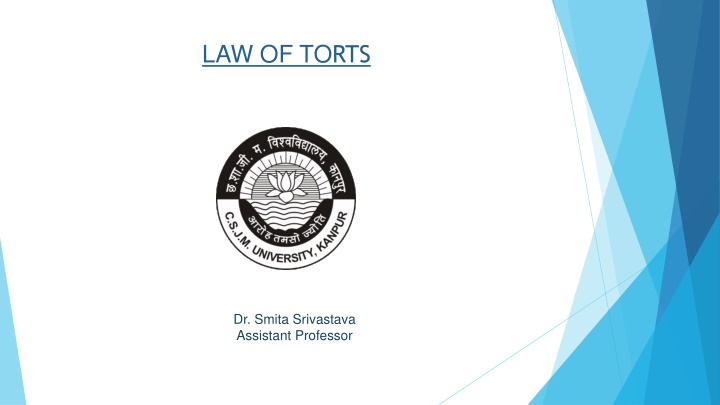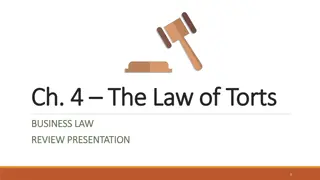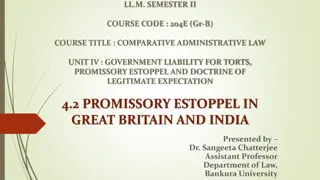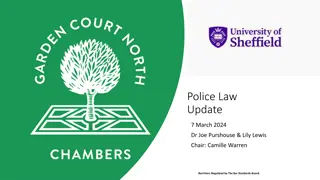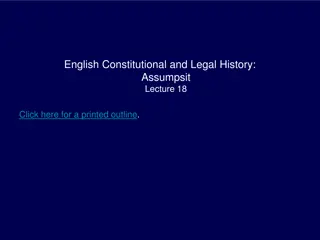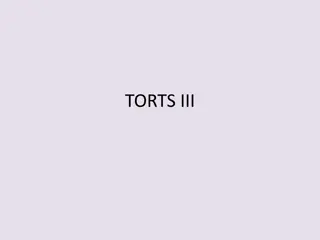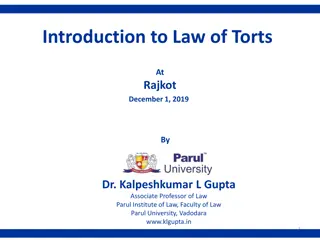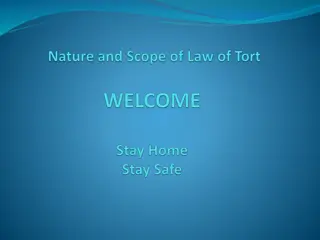LAW OF TORTS
Law of Torts refers to civil wrongs resulting in harm or injury, allowing for legal action to claim damages. It is not codified like statutory law and is based on English common law. Tort is a conduct that is wrongful and violates another person's legal rights, with remedies available in civil suits. This area of law involves actions beyond mere breaches of contracts or trust, enabling individuals harmed by others to seek unliquidated damages.
Download Presentation

Please find below an Image/Link to download the presentation.
The content on the website is provided AS IS for your information and personal use only. It may not be sold, licensed, or shared on other websites without obtaining consent from the author.If you encounter any issues during the download, it is possible that the publisher has removed the file from their server.
You are allowed to download the files provided on this website for personal or commercial use, subject to the condition that they are used lawfully. All files are the property of their respective owners.
The content on the website is provided AS IS for your information and personal use only. It may not be sold, licensed, or shared on other websites without obtaining consent from the author.
E N D
Presentation Transcript
LAW OF TORTS Dr. Smita Srivastava Assistant Professor
Meaning of Tort Tort : A french term derived from latin term tortum which means to twist. It implies a conduct which is not lawful, but twisted, tortious or wrongful. Equivalent to English term wrong, Roman term: deceit, andIndian term: civil wrong It is a wrongful act whereby legal right of another person is violated. It is breach of duty by one person towards another person. It is a system of laws, which enables a person who has suffered harm or injury by act of another, may claim damages in civil suit. Not codified like statutory law Based on English common Law
Definitions SECTION 2(M) OF LIMITATION ACT, 1963 Tort means a civil wrong which is not exclusively a breach of contract or breach of trust. SALMOND S DEFINITION Tort is a civil wrong for which remedy is a common law action for unliquidated damages, and which is not exclusively the breach of contract, or the breach of trust, or other merely equitable obligation.
WINFIELDS DEFINITION law. repressible by Tortious liability arises from the breach of duty primarily fixed by This duty is towards persons generally and breach is an action for an unliquidated damages. FRASER S DEFINITION Tort is an infringement of a right in rem (right in general) of a private individual giving a right of compensation at the suit of the injured party.
No scientific definition is possible Negative approach has been taken. Tort is a civil wrong which is redressible by an action for unliquidated damages and which is other than mere breach of contract or breach of Trust.
CHARACTERISTICS OF LAW OF TORTS It is a civil wrong Tort is other than a mere breach of Contract or Breach of Trust. It is redressible by an action for unliquidated damages.
UNLIQUIDATED DAMAGES Remedy in law of tort: Damages & Injunction Damages: money compensation which may satisfy the parties. Because it is not possible to undo the harm. Liquidated Damages: Compensation which is previously determined or agreed by parties. It is remedy in breach of trust and breach of contract Unliquidated Damages: when compensation is not previously fixed by parties and the same is left to discretion of courts.
Nature of Tort Nature of Tort can be understood by differentiating - Tort & Crime - Tort & other civil wrong such as breach of contract
TORT AND CRIME TORT CRIME Less serious More serious wrong Private wrong or Civil wrong Public wrong Action is brought by injured party Action is brought by State Compromise with wrongdoer is Settlement is not possible possible Remedy is damages i.e. money Remedy is punishment. Exception- compensation sec. 357 Cr.P.C.
TORT AND BREACH OF CONTRACT Tort Breach of Contact Results from breach of duty Breach of duty undertaken by imposed by law parties Duty is towards public at large Duty is towards specific person Remedy- Unliquidated Damages Remedy- Liquidated Damges
